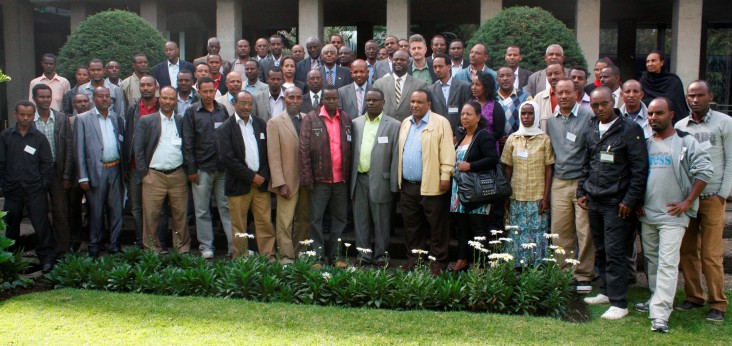
I am honored to be here to mark another milestone in USAID’s support to Ethiopia for land administration and land tenure. This issue is a cornerstone for Ethiopia’s growth and transformation plan for land management and land tenure is linked to peace and governance, to agricultural productivity and food security, to conservation of natural resources, and matters to the majority of Ethiopians who reside and farm around the country, and especially to women who are heads of households.
In 2009, President Obama launched the Feed the Future Initiative as the United States’ contribution to a commitment by the world’s wealthiest and most industrialized countries, known as the G-8, to promote agriculture and nutrition to achieve global food security. USAID’s Ethiopia Land Administration Program (ELAP) is one of many projects included under the Feed the Future Initiative here in Ethiopia.
Considering the importance of enhancing property rights and improving tenure security for sustainable development, the Government of Ethiopia (GOE) and USAID implemented the Ethiopia: Land Tenure and Administration Program (ELTAP), from 2005 to 2008. ELTAP had shown tangible results in improving the legal framework on rural land administration, in demonstrating cost effective surveying methods for rural cadaster, in increasing the awareness of multiple stakeholders on existing rural land administration and use laws and regulations, and in strengthening the institutional capacities of the federal and regional land administration agencies.
To maintain the momentum in firming up the country’s land administration system, the GOE and USAID formulated ELAP, which has been carrying since 2008. ELAP cooperated with federal, regional and local government officials to further strengthen property rights and land tenure in areas of Amhara, Oromia, Tigray, and Southern regions as well as parts of Afar and Somali regional states. ELAP’s work on the second level land certification is exemplary in improving tenure security and encouraging the holders to increase investment on their land. Most importantly, women and other vulnerable groups are able to exercise and protect their land use rights.
The establishment of a Land Administration and Land Use Directorate under the Ministry of Agriculture show the commitment of the Ethiopian Government to strengthen the land administration and use activities at a national level. We are pleased and proud that ELAP has provided an essential foundation for the overall land administration program of the country. With ELAP successes on land surveying, registration and certifications of hundreds of thousands of parcels, regions and woredas have been encouraged to invest on and scale up land administration activities.
We are glad to see best practices from ELAP are being used by the Government to craft a national Land Administration and Land Use Development Program (LALUDEP). Ethiopia’s Growth and Transformation Plan would benefit from LALUDEP and provide a platform for the Ethiopian Government’s different structures and development partners to come and work together. The Government of Ethiopia has also agreed to extend land use right certifications in the Agricultural Growth Program woredas among others as part of the G-8 New Alliance for Food Security and Nutrition policy commitments.
As we conclude this successful second phase of our cooperation and look to a new phase, I applaud and encourage federal and regional governments for their commitment to expand land administration activities and to allocate money to expand land surveying, registration and certification activities.
On behalf of the American people, I can reiterate and affirm that USAID will continue funding and technical assistance to strengthen the legal framework of the land sector, build capacity of land administration institutions at all levels, and expand use right activities to the pastoral areas. These actions in concert will increase productivity of farmers and livestock producers, increase incomes and food security, promote peace, conserve important natural resources, and, in sum, support Ethiopia’s plans for Growth and Transformation.
The lesson learned and best practices discussed today will inform our support to the future phases of this important work. There are many countries around Africa that will look to your example and that of the Government so I wish you much success.
Thank you.
See Also
Remarks by USAID Ethiopia Deputy Mission Director Jason Fraser [PDF, 167 KB]
Remarks by State Minister of Natural Resources H.E. Ato Sileshi Getahun, Ministry of Agriculture [PDF, 237 KB]
Related Resources
USAID Ethiopia: Agriculture and Food Security
USAID Ethiopia: Feed the Future







Comment
Make a general inquiry or suggest an improvement.